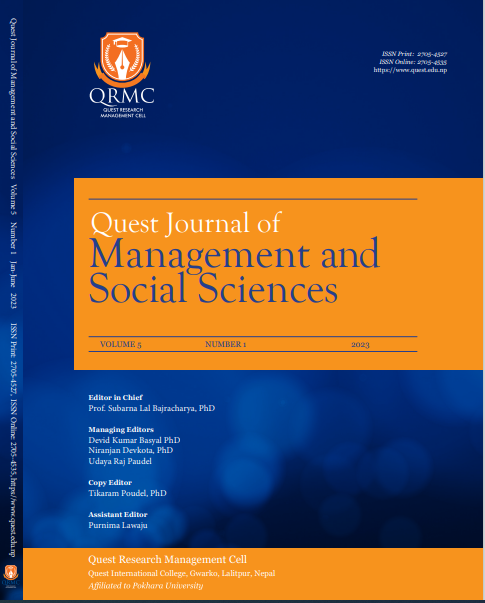An Econometric Analysis of Consumption Behavior of Nepalese People
DOI:
https://doi.org/10.3126/qjmss.v5i1.56270Keywords:
Income, MPC, Time Series and Cross-sectional DataAbstract
Background: Consumption is a crucial variable, influenced by level of income. The relationship between income and consumption referred as MPC.
Objectives: The main objective of the study is to find the relationship between current income and current consumption at the national and local levels.
Methods: During data analysis, we collected cross-sectional data (current income and expenditure) using a questionnaire from the study area. However, the time series data were obtained from a secondary source, and the econometric model was built on the absolute income hypothesis (AIH).
Results: MPCs have four different values. One is for the national level, and three are for the local level. The MPCs from cross-sectional data were derived according to the high, middle, and small income levels. The national MPC is 0.0000117 and local-level MPCs are 0.55, 0.46, and 0.92. The MPC of the middle-income group and national levels were not significant however the other two are significant.
Implications: The present study shows that the consumption and income relationship is stronger for high-income and low-income groups than for the middle-income and national level. However, the study was limited to rural individuals with agriculture as their primary occupation, and other factors such as debt, savings, and population size were not considered. The facts do not support the national level econometric consumption function. Therefore, we concluded that income is not the determining factor of consumption in the Nepalese perspective.
Conclusions: The income level is an important factor in determining the consumption level of people. This study was carried out based on the time series and cross-sectional data. There are four marginal propensities to consume (MPC), i.e. one for the national level and three for the local level.
Downloads
Downloads
Published
How to Cite
Issue
Section
License
Copyright (c) 2023 Quest Journal of Management and Social Sciences

This work is licensed under a Creative Commons Attribution-NonCommercial-NoDerivatives 4.0 International License.
This license enables reusers to copy and distribute the material in any medium or format in unadapted form only, for noncommercial purposes only, and only so long as attribution is given to the creator.




